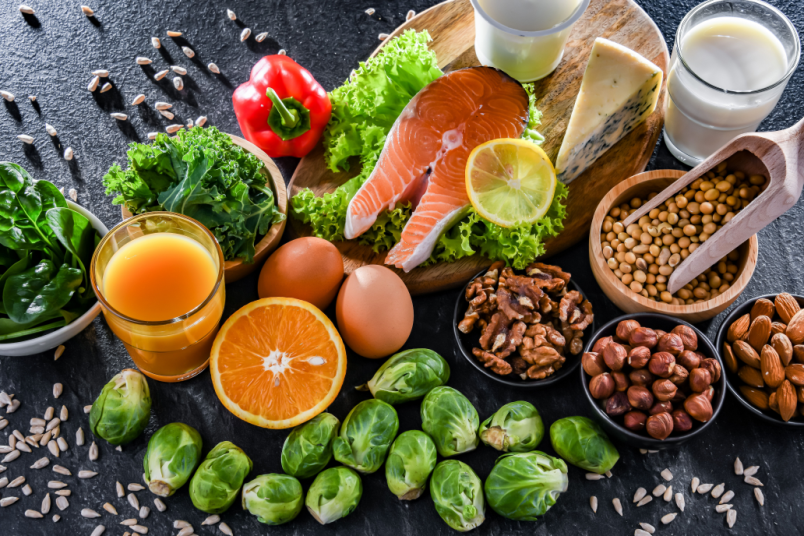Building strong bones is essential for a child’s overall health and growth. During childhood, the bones grow and develop rapidly, forming the basis for a strong skeletal system. In this blog, we’ll look at the key elements that help build strong bones in children, such as nutrition, physical activity, and lifestyle habits. Understanding and incorporating these elements can help parents actively support optimal bone health for their children, setting them up for a healthy and active future.
Vitamins and Minerals necessary for strong bones in kids

Ensuring your child's diet is rich in essential vitamins is crucial for building strong and healthy bones. Key vitamins and minerals essential for strong bones include:
Calcium: Calcium is a fundamental mineral for bone development and maintenance. It is integral to bone structure and strength. Dairy products such as milk, yogurt, and cheese should be included in the diet of your child. Additionally, fortified plant-based alternatives such as almond milk or soy milk can be an excellent source of calcium.
Vitamin D: Vitamin D facilitates the absorption of calcium and plays an essential role in the formation of bone mineralization. Natural sunlight exposure should be encouraged through outdoor activities. Foods such as fatty fish and egg yolks as well as fortified cereals help to increase vitamin D intake.
Vitamin K: Vitamin K plays a significant role in the maintenance of bone health, as it regulates calcium levels and encourages the mineralization of bone. Spinach and egg yolk are sources of vitamin K, which can be incorporated into a variety of dishes, such as salads, curries, and pasta sauces.
Phosphorus: Phosphorus, in synergy with calcium, forms the mineral structure of bones and teeth. To ensure your child's phosphorus intake is sufficient, include lean foods such as meat, poultry, and fish, as well as dairy products and whole grains.
Magnesium: Magnesium plays a critical role in the formation of bone tissue and is essential for bone growth. Consuming magnesium-rich foods such as nuts, seeds, and whole grains, as well as green, leafy vegetables such as spinach and broccoli, can help to replenish magnesium levels in the body. Snack options can include a mix of nuts and seeds.
Vitamin C: Vitamin C plays an important role in the production of collagen, which is a protein necessary for the maintenance of bone structure. You can add vitamin C-rich foods such as oranges, strawberries, kiwi, etc. to your kid’s meals or snacks.
Vitamin A: Vitamin A promotes the growth of bone cells by promoting the activity of osteoblasts. Vegetables such as sweet potatoes, carrots, and leafy greens should be included in your child’s diet.
Zinc: Zinc contributes to bone mineralization and supports the function of bone-building cells. Foods such as lean meats, nuts, seeds, and dairy products are good sources of zinc. Consider incorporating zinc-rich options into your child’s meals and snacks.
By including these vitamins in a balanced and diverse diet, parents are able to actively support the growth and development of robust and durable bones in children.
Practical tips for parents to incorporate essential nutrients into their kid’s diet

Variety is key: Aim for a diverse and colourful diet to make sure your kids are getting a wide variety of vitamins and minerals.
Creative cooking: Experiment with recipes to make nutrient-rich foods appealing to your child. Incorporate vegetables into curries and sauces, make smoothies with fruits, or create fun, bite-sized snacks.
Meal planning: When planning meals, make sure to include a variety of food groups to ensure your child is getting all the nutrients they need for bone health.
Lead by example: Kids imitate their parents, so showing them how to eat healthy, promotes a positive attitude toward eating healthy foods.
Ways to develop healthy bones in kids

Nutrient-rich diet: It is important to ensure that your child is getting adequate amounts of calcium and vitamin D which are necessary for bone health. Dairy products, green leafy vegetables, nuts, and fortified foods should be included in their diet.
Regular exercise: It is necessary to encourage weight-bearing activities such as running, jumping, and sports as they increase bone density and strength.
Sunlight exposure: Exposure to sunlight stimulates the production of vitamin D in the skin. Encourage your child to take part in outdoor activities to promote bone health.
Limit soda and caffeine intake: Consumption of soda and caffeine may impede the absorption of calcium. Encourage kids to drink water or milk.
Healthy snacking: Provide nutrient-rich snacks such as cheese, yogurt, and fruits to ensure a balanced intake of calcium and other key vitamins.
Additional supplements: Consult with a healthcare provider to determine whether your child requires calcium or vitamin D supplements, particularly if there is a deficiency in their diet.
Maintain a healthy weight: Excess weight gain can put strain on developing bones. Support a healthy weight with a balanced diet and regular exercise.
Limit screen time: Excessive screen time can lead to an inactive lifestyle. Encourage breaks for physical activity to promote bone strength.
Adequate sleep: Make sure your child is getting a good night’s sleep. Sleep is essential for your child’s health and growth, including the health of their bones.
Regular check-ups: To keep track of your child’s growth and development, make sure to schedule regular pediatric appointments, including bone health assessment.
It is essential to tailor these recommendations to your child's age and individual needs. Always consult with a healthcare provider for personalized advice regarding your child’s bone health.
In conclusion, building strong bones in children requires a balanced approach. Nutrient-rich diets, physical activity, exposure to sunlight, and healthy lifestyle choices form the foundation. By prioritizing these elements, parents can contribute significantly to their child's optimal bone health, ensuring a robust and active future.
KM NU Hospitals is renowned for its exceptional Pediatric and Neonatology care. With a commitment to excellence, they provide comprehensive medical services for children, ensuring their well-being. The hospital combines state-of-the-art facilities with a dedicated team of specialists, offering compassionate and expert care for pediatric and neonatal health challenges.
References:
1. 3 Ways to Build Strong Bones. NEMOURS KidsHealth. https://kidshealth.org/en/parents/strong-bones.html#.
2. Parents' Guide to Building Better Bones. Physicians Committee for Responsible Medicine. https://www.pcrm.org/good-nutrition/nutrition-information/health-concerns-about-dairy/parents-guide-to-building-better-bones.
3. Kids and Their Bones. National Institute of Arthritis and Musculoskeletal and Skin Diseases. https://www.niams.nih.gov/health-topics/kids-and-their-bones.
4. Minerals for Bone Health. AMERICAN BONE HEALTH. https://americanbonehealth.org/nutrition/minerals-for-bone-health/.
Author: Dr. Palanirajan P
